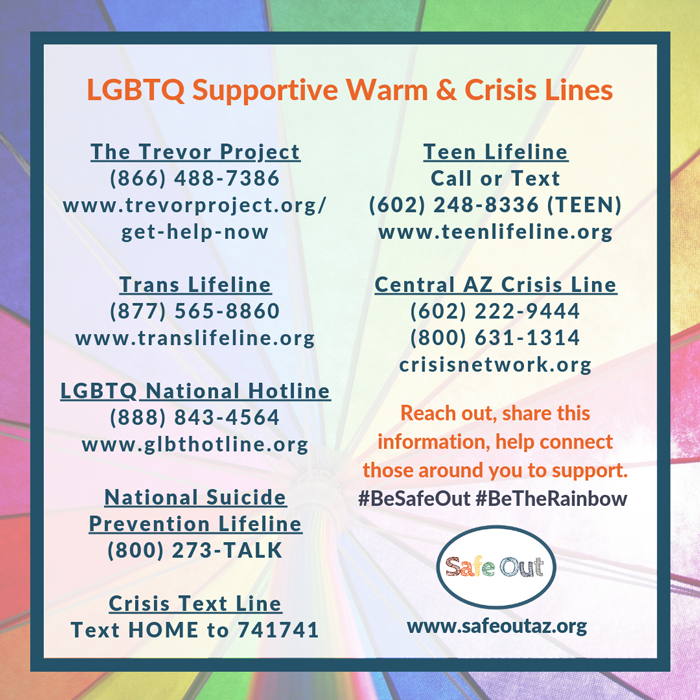Ask, Care, Tell
ACT when a young person is in distress
Here at Terros Health
September is Teen Suicide Prevention Month in Arizona and in conjunction with awareness events such as National Suicide Prevention Week and World Suicide Prevention Day, we want to help families, parents, school officials, students and youth to be aware of their own mental health and emotional well-being, and that of their loved ones.
Students and young adults who have shared that they have emotional distress and suicidal thoughts often identify feelings of having too much pressure or of being isolated.
Every problem has a solution. Please know there is hope, and there is help.
Warning Signs
- Threats of suicide—either direct or indirect
- Verbal hints such as “I won’t be around much longer” or “It’s hopeless”
- Obsession with death
- Increased or sudden isolation
- Depression
- Overwhelming sense of guilt, shame or rejection
- Putting affairs in order (for example, giving or throwing away favorite possessions)
- Sudden cheerfulness after a period of depression
- Dramatic change in personality or appearance
- Becoming angered easily
- Bizarre thoughts
- Changes in eating or sleeping patterns
- Changes in school performance
- Lack of interest in future plans
What can you do if the person is a friend?
If you think someone you know is at immediate risk of suicide, you need to ACT.
A=Ask
Ask your friend if they are considering suicide or if they have a plan to end their life. It’s okay to be direct, just try to be non-judgmental and show you care.
C=Care
If you think someone is in immediate danger, stay with them and offer to go with them to find help. Even if it doesn’t make sense to you, try your best to sympathize and offer support. Try not to leave someone with suicidal thoughts alone.
T=Tell
Tell a trusted adult what’s going on. Your friend might ask you not to tell anyone, but you should never keep talk of suicide a secret. It is worth breaking trust to save a life. You should never try to handle the situation by yourself. The most helpful thing you can do is guide your friend to someone with training.
Seek help by calling 911 or the Crisis Response Network at 1-800-631-1314.
What can you do for your child?
If your child is in crisis, face the situation head on:
- Talk about suicide. As parents, we often are afraid to ask, fearing it will perpetuate the thought. It won’t. Ask directly “Do you want to kill yourself?” Ask what makes them want to die. Ask them to think about what they have to live for (a special pet, friend, relative).
- Remove access to means. This includes guns, knives, ropes and belts, and prescription drugs and over-the-counter medication.
- Seek professional help and evaluation. If you have private insurance, obtain a list of credentialed counselors in your area, and call for an appointment.
- It’s an emergency. Know that the Crisis Response Network is available 24/7 and can immediately dispatch a mobile unit to help. If you think your child has overdosed call 911 or take them to the nearest emergency department.
What can you do for a student?
For teachers, when you observe changes in a student’s behavior, pay attention. If the changes concern you, talk with the student if you’re comfortable doing so. Feel free to consult your school’s resources staff about your observations. Follow your school’s protocol for helping a student in distress. Your role in youth suicide prevention is critical—staff who have been educated and have an awareness of youth suicide are a school’s greatest prevention resource! There are great resources and training for educators at https://www.sptsusa.org/educators/.
If you are seeking ways to help students that appear to be struggling with behavioral health issues, you can access tips and further assistance at http://www.mentalhealthamerica.net/conditions/tips-teachers-ways-help-students-who-struggle-emotions-or-behavior.
Where can I access local training in suicide prevention?
The Safe Out LGBTQ Youth Coalition in Arizona provides safeTALK Suicide Prevention Training, available free and open to the public on a quarterly basis. Through this training, folks learn how recognize the signs of suicide and how to connect those struggling with help. No previous mental health experience or training is required.
To learn more about the availability of the next training, contact Isaac Akapnitis at 602-685-6082.
More help and Resources:
- Crisis Response Network, 1-800-631-1314 or 602-222-9444 (Central Arizona);
- Crisis Response Network, 1-877-756-4090 (Northern Arizona)
- Community Wide Crisis Line, 520-622-6000 (Southern Arizona)
- Teen Lifeline, 602-248-8336 (TEEN) or 1-800-248-8336 (TEEN)
- National Suicide Prevention Lifeline, 1-800-273-8255
- The Trevor Project for LGBTQ Youth: 866-488-7386
- Trans Lifeline: 877-565-8860: Support for transgender people, by transgender people
- Terros Health, (602) 685-6000 to schedule an appointment with a behavioral health clinician
- If you have private insurance, call your insurance. If you have AHCCCS, please call Mercy Maricopa Integrated Care (AHCCCS and Medicaid recipients), 1-800-564-5465
- Suicide Resource Center (American Academy of Child & Adolescent Psychiatry) aacap.org/aacap/Families_and_Youth/Resource_Centers/Suicide_Resource_Center/Home.aspx
